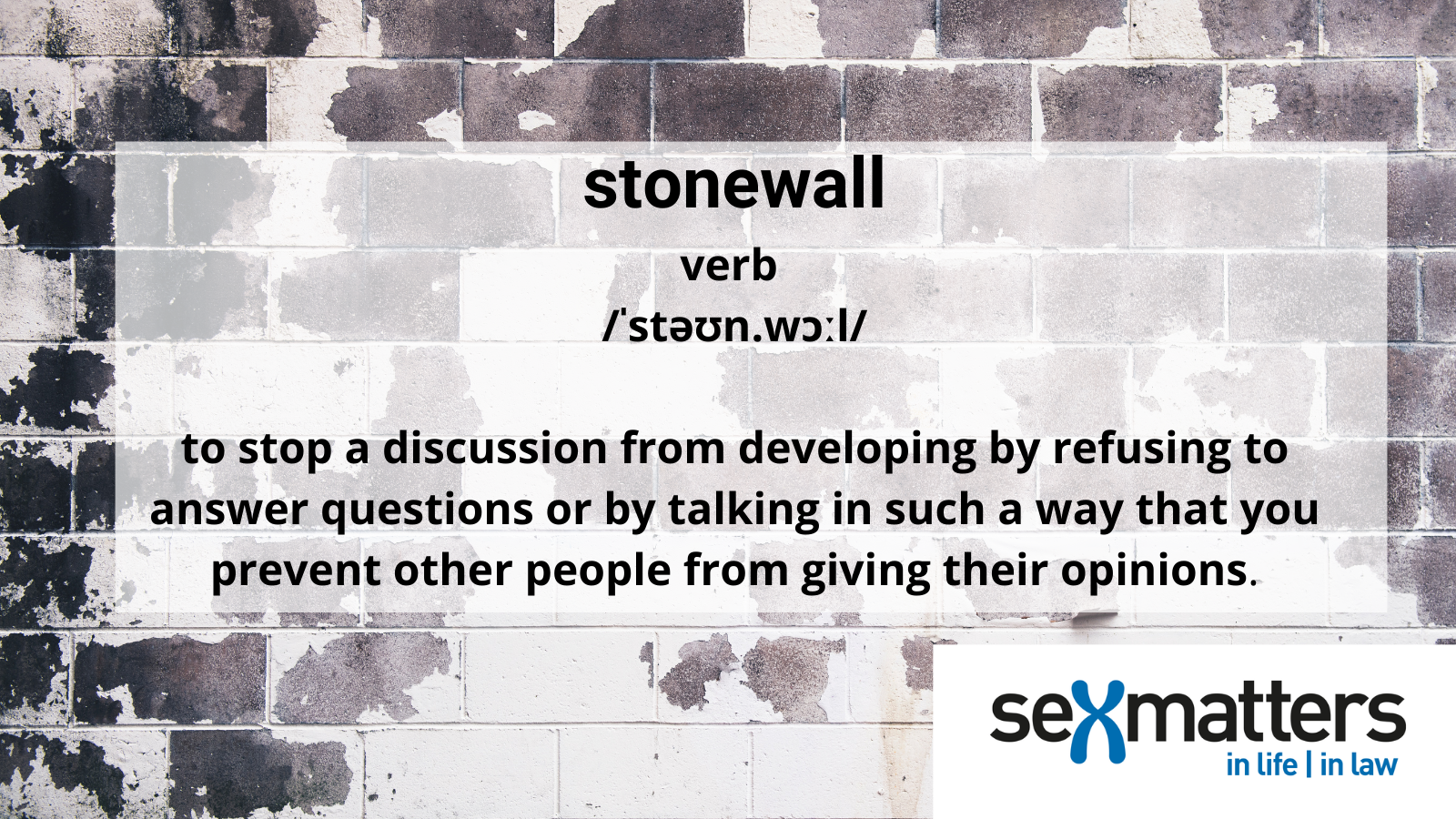Truth and reconciliation
How should the public sector leave the Stonewall Champions Scheme?

It has been reported that:
“the Government is due to make a decision next week on whether to withdraw Whitehall departments from the [Stonewall Diversity Champions] scheme”.
Several central government departments and agencies have already left. Sources at the Ministry of Justice told the Telegraph that the permanent secretary is now reviewing the department’s diversity policy on behalf of the minister, Robert Buckland, and suggested that the decision to withdraw was based on concerns about value for money, Stonewall’s “dubious” training and its approach to free speech.
The Schools inspectorate, Ofsted, has quit the scheme, amid revelations that Stonewall encouraged it to threaten primary schools with the prospect of low ratings if they did not ensure that all children were aware of “sexual orientation and gender reassignment” by the time they moved on to secondary school.
(Recognition is due here for the recent excellent, dogged reporting on this issue by the Telegraph, joining the Times, Spectator and The Economist. Even Stonewall Champions the Guardian and Observer and BBC appear to be waking up).
We have written to all 850 Stonewall Champions and are tracking the trickle that may turn into a flood as they leave.
Many are citing value-for-money considerations and a bland rationalisation of membership of external schemes. The Equality and Human Rights Commission left, saying that its membership of the scheme only ever concerned employment and “internal affairs”—as if making employees afraid for their jobs and careers would not impact on the decisions they make.
This will not hold. It is a scandal. We have seen examples of Stonewall coaching the communications teams of government agencies on how to respond to public questions about sex and gender, and on how to respond to FOI requests so as to withhold embarrassing information from the public. The ONS, CPS, EHRC, Care Quality Commission, MoJ and Government Legal Department, to name but a few, have clearly been influenced in their external positions and policies. At the most basic level, if you erase the distinction between males and females in your data collection and Equality Impact Assessments, as Stonewall advises, then you have no mechanism for assessing whether any policy decision in relation to “trans rights” harms women, or any other group. And if you punish anyone who points that out, you are sure never to find out.
We have heard from staff in government departments, major corporations and universities who are frightened of questioning policies, or who have been reported simply for pointing out inconsistencies between policies and the Equality Act. Staff (including gay and lesbian staff) tell us that their organisations’ “LGBTQ+ and Allies” groups act as thought police.
Even more fundamentally, the Stonewall scheme, by design, involves organisations paying out every year to be never-endingly dependent on an outside organisation for a core responsibility, rather than embedding their own in-house expertise. That alone should have rung alarm bells with people responsible for public money.
Several members of the Stonewall Champions scheme have responded to our Freedom of Information requests with the implausible answer that they filled the several-thousand-word questionnaire directly into Stonewall’s online submission portal and didn’t keep a copy. Others claim exemption from FOI obligations on the basis of the harm that publication might do to Stonewall’s commercial interests. Bedfordshire University responded on corporate letterhead bearing the Stonewall Champions logo, saying that it had never had a relationship with Stonewall (it then said a staff member working from home had used old letterhead, and then that its legal team was investigating). The ONS claims that because a single staff member left, it no longer has access to the information it submitted to Stonewall.
Departmental Ministers and Directors General should make clear that they will not accept these cat-ate-my-homework and then cat-fell-into-the-shredder excuses from their teams.
First thing on Monday morning, they should be demanding the full Stonewall files on their desk to see just what their organisations have done—at what cost, and with what harm, and what needs to be undone. And they should be thinking about a proactive plan for disclosure, rather than waiting for the army of polite and persistent, but also very angry, opponents of gender-identity ideology to drag it out of them through war-of-attrition FOI requests, internal reviews and appeals to the Information Commissioner’s Office.
A strong steer from the Cabinet Office will help to stiffen the spine of senior civil servants who, to date, have themselves been afraid to challenge the he/hims, she/hers and they/thems in their organisations. The Reindorf Review is helping University Vice Chancellors do the same.
We suspect that many already know that something has gone badly wrong in their diversity and inclusion policies and departments. As Senior Psychiatrist David Bell said of the many clinicians with concerns about the youth transitioning GIDs unit at the Tavistock Clinic:
“It was peculiar. You could see that everyone knew about it and yet no one wanted to know about it. In the adult department, there was a sense that we didn’t want to find out what went on there, because we might not have liked it if we did.”
Ofsted’s Amanda Speilman gave an address to the Stonewall Education conference in 2019, as protesters stood outside, raising the issue that needed to be discussed. Her excellent speech was a memo-from-the-adult-department, which went unheeded:
“The exercise of one right can sometimes be seen as limiting of another right. The different protected characteristics can and do bump into each other…There is no hierarchy in the law. One characteristic does not have primacy over another…Dialogue is essential to calm tensions and find pragmatic solutions that do meet the requirements of the law.”
Since then, Stonewall has continued to double down, recently reaching the nadir of comparing gender-critical views to antisemitism. And government bodies have gone along with it.
How can this be unpicked?
A simple edict from the Cabinet Office to leave Stonewall would be satisfying in the short term, but would also be seen by some as part of a culture war to be resisted intransigently.
Matthew Rycroft, the Home Office permanent secretary and race champion, told civil servants in a lunch (over Zoom) that as part of race networks they should accept the democratically elected government’s policy “on some issues”. On others, however, “it’s for us…to be stewards”.
Police forces say that the LGBT Lead of the National Association of Police Chiefs has been delegated to come up with a policy in response to the pressure to leave the Stonewall scheme.

The soft power of the Mandarins is not to be underestimated. And whether because of naive good intentions, true allegiance to queer theory or fear of the consequences of dissent, they will find ways to continue with their project, as long as the incentives remain the same. Unless steps are taken to get to the bottom of the problem they will simply move on to other external allies, such as Gendered Intelligence, Global Butterflies, Mermaids or the LGBT Foundation, or to the internal affiliate groups and LGBT leads (the “Stonewall Stasi” as one civil servant put it to us). In the NHS, Stonewall and the LGBT Foundation are promoting a new “Pride in Practice” programme with the familiar bronze, silver and gold assurance framework. In the legal sector Stonewall has been rebranded into spin-offs such as “Freebar” and the Interlaw Diversity Forum.
It is important that the next stage enables people to recognise and articulate within their organisations and professions what they already know (and have known for a long time) about the problem with the gender-identity lobby and assurance schemes, and about the dangers of delegating power to internal “affiliate groups”. Organisations must not shred or bury the evidence, nor assume that just by shedding Stonewall the culture of fear that their former links created will somehow be ended.
Care is also needed to avoid a backlash against the rights of gay, lesbian, bisexual and transsexual people. Too many workplaces are still accepting of casual and explicit homophobic “banter”, harassment and discrimination, alongside sexist and racist banter and discrimination.
So what should the government do? It should tell (or recommend where decision-making is at arm’s length) ministries and government agencies to suspend renewal of their membership of the Stonewall Champions Scheme this year pending review, and not to participate in this year’s Workplace Equality Index, which opens on June 15th.
Instead, they should initiate a process of “truth and reconciliation”, both internally and with the public. This starts with “finding” the missing information from previous years’ submissions to the Stonewall Scheme, and the associated decision-making, and publishing these in full.
They should divert the time and money that would have been used to undertake the Stonewall survey and compliance scheme this year towards investigating it. Instead of initiating the annual Stonewall staff survey, they should carry out an information-gathering process with staff to find out what they really think about the gender-neutral toilets, conflation of sex and gender identity, pronoun announcements, rainbow lanyards and mandatory IDAHOBIT appreciation. To make this meaningful, they will first have to convince staff that they can speak the truth without fear of losing their job.
They should review policies that may run counter to the Equality Act and to their safeguarding responsibilities and risks. And where those policies are found to be inconsistent, they should review the process by which this was allowed to happen. They should consider age, race, sex, religion or belief, disability and other protected characteristics.
And they should accept that every part of this process that can be FOI’ed will be FOI’ed, and therefore start out with transparency as their guiding principle.
They should also consider the principles of public administration. How did they (and so many public organisations) make themselves accountable to and dependent on an external organisation in this way? No large organisation should need this sort of continuous input from an external organisation on something as basic as compliance with equality law. Government departments do not each need to continually reinvent this individually.
The trend in regulation for a long time has been light touch, moving away from auditing the detail of what organisations do, to looking at their systems. Here hundreds of government departments and public bodies have submitted to the most old-fashioned, intrusive, second-guessing and extraordinarily heavy-handed detailed scrutiny of their internal activities, each year, by an external “auditor”. And they have evaded their own risk-management systems in doing so. Stonewall’s business model creates perverse incentives to keep moving the goalposts (and changing the language) so that the organisations it audits will feel they need to continue paying for its services.
There is a question to ask about how so many senior managers appear to have unquestioningly accepted this as a reasonable way to ensure compliance with one small part of the Equality Act (which has not changed since 2010). Think tanks like the Institute for Government, the Institute for Business and Human Rights and the Social Market Foundation should start paying attention. Policy Exchange has already started, raising the issue in relation to the Law Commission.
Ultimately, the government should establish a wide-ranging independent inquiry into government bodies’ use of the Stonewall scheme, and their reliance on external lobby groups for training and accreditation around diversity and inclusion in general.
But the first step for Monday morning is transparency and setting a new tone from the top. Let the sunlight in and declare a decisive end to the era of “no debate”.
